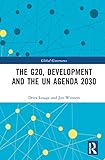The G20, development and the UN agenda 2030 / edited by Dries Lesage and Jan Wouters.
Contributor(s): Lesage, Dries [editor.] | Wouters, Jan [editor.].
Publisher: UK : Routledge, 2023Edition: First Edition.Description: ix, 247p.ISBN: 9781472475213.Subject(s): International economic relations | Economic policy -- International cooperation | Civil societyDDC classification: 337 Summary: "This book offers a unique assessment of the G20's development agenda and its potential to be an impactful actor in the global architecture of development cooperation. Representing two-thirds of the world population, 85 percent of economic output, 75 percent of global trade, and 80 percent of carbon dioxide emissions, the G20 embodies an overwhelming concentration of economic and political power, enhanced through regular meetings of heads of state and government. This position allows it the opportunity to play a significant role in ongoing multilateral policy processes, but also to further undermine universal development governance at the UN, already challenged by the Bretton Woods institutions, OECD and G8. Providing context and a history of the G20's involvement in development governance, expert international contributors consider the outcome of major conferences, the perspectives of China, India, and the EU, the shift away from positions held by Western countries and the role of civil society. They also offer in-depth analysis of the G20's engagement with issues concerning infrastructure, food and agriculture, taxation, macro-economic policy and the Sustainable Development Goals. The book will be of interest to scholars and students of development, international organisations and global governance"--| Item type | Current location | Call number | Status | Date due | Barcode |
|---|---|---|---|---|---|
 Books
Books
|
NASSDOC Library | 337 G20- (Browse shelf) | Available | 53584 |
Includes bibliographical references and index.
"This book offers a unique assessment of the G20's development agenda and its potential to be an impactful actor in the global architecture of development cooperation. Representing two-thirds of the world population, 85 percent of economic output, 75 percent of global trade, and 80 percent of carbon dioxide emissions, the G20 embodies an overwhelming concentration of economic and political power, enhanced through regular meetings of heads of state and government. This position allows it the opportunity to play a significant role in ongoing multilateral policy processes, but also to further undermine universal development governance at the UN, already challenged by the Bretton Woods institutions, OECD and G8. Providing context and a history of the G20's involvement in development governance, expert international contributors consider the outcome of major conferences, the perspectives of China, India, and the EU, the shift away from positions held by Western countries and the role of civil society. They also offer in-depth analysis of the G20's engagement with issues concerning infrastructure, food and agriculture, taxation, macro-economic policy and the Sustainable Development Goals. The book will be of interest to scholars and students of development, international organisations and global governance"--
English.


There are no comments for this item.